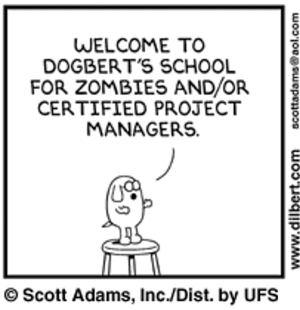By Gary Hinkle Jeff’s venture into engineering management isn’t quite what he expected. He manages a group of seven engineers at a semiconductor company, but he continues to work as a hands-on engineer. He’s highly regarded for his technical expertise, which is why he was offered the management position five years ago.
By Steve Wetterling There was once a very successful American company that made clothes washers. Their machines did a good job of washing clothes and delivered decades of reliable service. When we were newly married college grads, we purchased one as soon as we could afford to. It washed our clothes for 24 years.
By Steve Wetterling Who would want to work for, with, or anywhere near a Project Manager you can’t trust? And how would you know he couldn’t be trusted? What does he look like, this untrustworthy PM?
By Gary Hinkle Most engineers are unhappy with the “promotion” to manager, according to Michael Aucoin in his book From Engineer to Manager: Mastering the Transition. "Much of this frustration is the result of lack of preparation and training," he writes.
By Steve Wetterling Proponents (including me) of project management methods and practices extol this invention as the best way to do all work that falls in the category of “new stuff.” When project teams skillfully develop a charter, scope and limits statements, work breakdown structures, schedules, budgets, risk analyses, etc.—and hold to them—they’re far more likely to succeed than projects teams that do not.
By Gary Hinkle I’d be surprised if anyone reading this hasn’t witnessed this problem: estimates from the experts doing the work don’t align with management’s expectations. Why? Because management, committed to ambitious business goals, has dictated an unachievable schedule. Or they’ve made premature commitments to customers. The experts’ estimates are often realistic, but the reality isn’t acceptable to management.
By Steve Wetterling Back when the Project Management Institute was an unheard-of start-up organization, I took my first project management course. The instructor was Ron LaFleur, a dynamic teacher who had managed all sorts of military and aerospace projects for Raytheon during the height of the Cold War. In the three-day course, he shared with us what he had learned during his long and varied career.
By Steve Wetterling Don’t you just love optimism? By that I mean, for example, when we see the possibility for success rather than failure. That’s optimism. Or when we see a glass that’s half full rather than half empty. That’s optimism, too. To some extent, it’s a matter of perspective. We can choose to see the world as a place stacked with opportunity or loaded with problems.
By Gary Hinkle Stretching a Stretch Goal How far can you stretch a stretch goal before it snaps? Wouldn’t it be nice if there were a formula for that—if it were actually a predictable property with a scientific underpinning you could look up in your old physics textbook?









